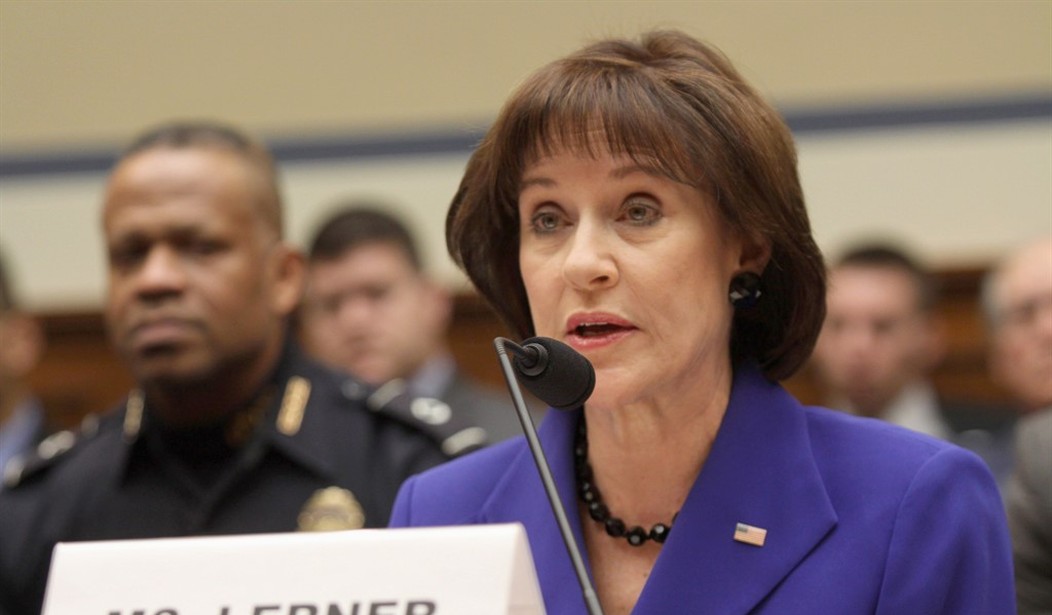President Obama's Department of Justice has made it official: Lois Lerner, the IRS executive who invoked the Fifth Amendment to avoid incriminating herself when questioned about her role in targeting conservative groups, will face no criminal charges. Worse, even the one IRS reform that enjoys broad bipartisan support in Congress - a ban on the IRS trying to assess gift tax on contributions to non-profit organizations, which they infamously attempted against conservative donors - has stalled in the Senate after passing the House unanimously early in the year. It should be included in one of the must-pass bills expected to pass in the next few weeks.
In 2011, donors to conservative groups were told that despite decades of clear legal understanding and practice, they could be found liable for gift tax on their contributions. While the IRS never did impose such a tax, the threatening letters they sent likely had a chilling effect on contributions to conservative groups, which was probably the point.
Taxing contributions to nonprofits would do nothing to advance the intended purpose of the gift tax - enforcing compliance with the federal estate tax - and would serve to dramatically diminish the ability of groups across the political spectrum to educate and mobilize citizens in the public policy process.
On June 3, 2011 House Ways and Means Committee Chairman Dave Camp sent a letter about the gift tax to then-IRS Commissioner Doug Shulman, inquiring more broadly: "the IRS appears to have selectively targeted certain taxpayers who are engaged in political speech. Not only does this threaten political speech, it casts doubt on the IRS's credibility as an impartial enforcer of the nation's tax law."
Ten days later, on June 13, 2011, Lois Lerner claimed that her hard drive crashed, destroying what she described as "documents in the files that are irreplaceable." The drive was physically destroyed in a way that prevented data recovery. Lerner refused to answer any questions about the scandal, invoking her right not to incriminate herself. And now she will enjoy her retirement with a full pension.
Deputy Commissioner Stephen Miller replied to Camp on July 1, 2011. "The IRS is apolitical and non-partisan," Miller said. "All decisions made and actions taken with respect to the matter were performed by career employees in the normal course of their duties."
In a similar letter to Senator Orrin Hatch, who had also inquired about the issue, then IRS commissioner Douglas Shulman himself pointedly stated: "I can assure you that there was no involvement by any political appointee, inside or outside the agency, in the initiation of these letters."
But thanks to Judicial Watch's intrepid FOIA litigation, we now know that in fact Obama-appointee William Wilkins, the IRS general counsel, edited and signed off on the targeting memo and that high-level IRS officials were involved from the beginning. And the supposedly neutral career staff working on the issue relied on ultraliberal sources including the Daily Kos, SourceWatch, CrooksAndLiars, the Washington Independent, and a floor speech by Senator Chuck Schumer.
Given this sordid history, Rep. Peter Roskam's H.R. 1104, the Fair Treatment for All Donations Act, should be a priority in Congress. It passed the House without opposition back on April 15 after stirring words of support from Democrat John Lewis, who said: "This bill brings clarity to what has historically been uncertain tax treatment for contributions to social welfare organizations, agricultural associations, labor unions, and trade associations. With this bill, Mr. Speaker, amounts contributed to such organizations will not be subject to the gift tax. I urge all of my colleagues on both sides of the aisle to vote 'yes' for H.R. 1104."
Yet there has been no Senate action for six months, and opposition has actually surfaced from people who like fear of a politicized IRS deterring contributions to non-profit groups. Meredith McGehee, policy director for the Campaign Legal Center, a speech-restricting advocacy group, said: "It strikes me as a wrong-headed move at the wrong moment," and Congressional Quarterly described her as "worried the measure would remove a potential deterrent - the fear of potential gift-tax liability - for mega-donors."
The House need not acquiesce to Senate inaction on the issue. There will be a series of must-pass bills coming to the floor shortly and including H.R. 1104 on one of them should be a no-brainer to force Senate action and finally provide some small measure of control over an abusive IRS that so far has managed to avoid all accountability.
A Small But Real IRS Reform That Must Pass
The opinions expressed by columnists are their own and do not necessarily represent the views of Townhall.com.

Advertisement
Recommended
Trending on Townhall Videos
Advertisement
Advertisement
Advertisement
























Join the conversation as a VIP Member